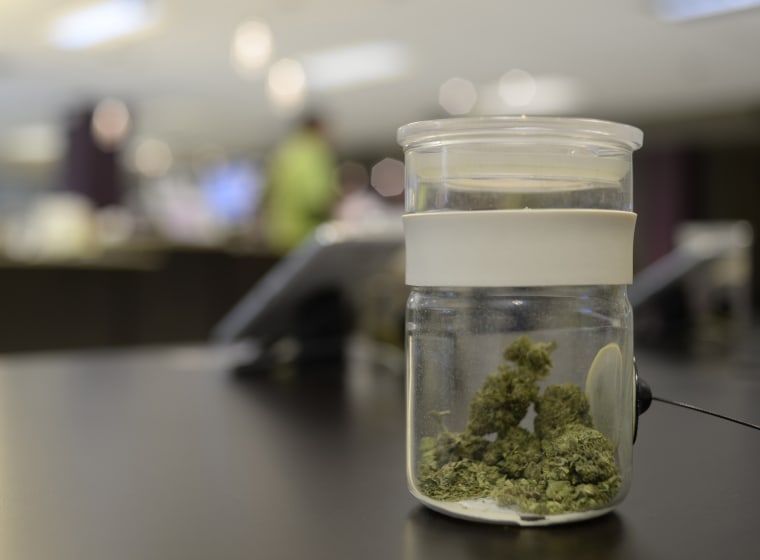As marijuana prohibition falls in one state after another, cannabis sales are shifting from street corners to storefronts as opportunists line up to cash in on what optimists say is the biggest investment opportunity since the dot-com boom of the turn of the century.
Investors of all varieties are starting to look at marijuana as less of a stoner’s fad and more of a serious business venture. The industry totaled $2.66 billion in U.S. sales in 2014, up 74 percent from $1.53 billion the year before, according to the ArcView Group, a cannabis industry investment network.
Business insiders said they expect the market to expand to many times its present size as more states legalize marijuana for both medical and recreational use.
Already the cannabis trade has not only brought in millions for dispensary owners and cultivators, it’s also created a thriving ancillary market, driven job growth and boosted property values, marijuana advocates claim.
Still, the challenges are many for the kind of high-risk, high-reward investment that cannabis calls for. No industry since post-Prohibition alcohol has come close to having had a harder time getting off the ground, from strict regulation and heavy taxation to a lack of investors and banking services.
“A lot of people look at the cannabis industry and say, ‘Oh my God, it’s so much harder. (There are) so many barriers ... You've got endless problems,’” said Troy Dayton, CEO of the ArcView Group. “Well, some people see endless problems. Other people see endless problems disappearing fairly soon and see this as a great investment.”
Dispensaries, cultivators not only ones making money
Jamie Perino, the CEO of Colorado-based Euflora dispensaries, said the three-store chain has so many customers that it wants to open more outlets, not only in Colorado but also across the country.
Perino estimated that Euflora, dubbed the “Apple store” of pot for its tablets next to every product displaying information about potency, strains and more, brings in 2.5 million visitors a year at its 16th Street Mall location in downtown Denver.

Perino isn’t a marijuana enthusiast, but the financial opportunities were too good to pass up after Colorado became the first state to legalize recreational marijuana in 2012. Dispensaries began opening in 2014. After working in the building industry for 15 years, Perino made the switch.
“There were CEOs, CFOs, from pharmacy, banking, real estate,” Perino said. “People were leaving their jobs to get into this industry, and I think that if they are getting into it, maybe they know something I should know. ... It’s kind of being compared to the tech boom of several years ago and to be at the forefront of it is really exciting.”
Colorado alone brought in about $79 million from taxes and fees on the marijuana industry in fiscal year 2015. On the fringes, ancillary business also have found money-making niches to fulfill the needs of marijuana businesses.
Cultivators need high-wattage lights to grow cannabis indoors. States have contracted seed-to-sale tracking systems to try and stop cannabis from slipping to the black market. Limousine companies shuttle paying customers from dispensary to dispensary.
Legal Marijuana Boosts Vape Shops' Bottom Line
J.B. Woods, co-owner of Greenpoint Insurance Advisors LLC, is based in the Denver area but specializes as an insurance broker for dispensaries nationwide. It’s a necessity for companies storing marijuana by the pound and cash by the bundle.
“There are a couple of states who have made it really very clear that insurance is an important part of the licensing process,” Woods said.
The security danger spawned by the all-cash industry also has created a secondary market of its own. Companies provide security cameras, alarm bells and guard dogs.
As acceptance spreads, industry matures
When the ArcView Group first started hosting conferences to connect marijuana businesses with cautious early investors, the events reinforced quite a few stoner stereotypes, ArcView CEO Dayton said.
He described a ragtag lot who cared more about smoking weed than making money off it. Many of the presenters looked uncomfortable in suits and ties and floundered through their pitches.
ArcView events now draw a sharply dressed mix of professionals who whip through presentations with practiced precision – a reflection of the maturing industry, Dayton said.
As more states legalize, shifting social attitudes have opened the door for a host of white-collar professionals who once shied away at the mere mention of marijuana. Lawyers are leaving their corporate firms behind. Bankers are closing down their tills. Business is serious. Business is brisk.
From Hawaii to New York, 23 states across the country, plus Washington, D.C., have approved marijuana for medical use, with Alaska, Colorado, Oregon, Washington state and Washington, D.C., legalizing recreational marijuana, as well.
The legalization tide has flooded the marijuana market with entrepreneurs who must distinguish themselves amid rising competition.
There are hookahs and bubblers, volcano vaporizers and percolated bongs. Consumers slurp down THC-infused ice cream and gnaw on gummy bears. They slather on lotions permeated with marijuana oil and dollop out droplets of tinctures, cannabis extracted with alcohol. The secondary market of ancillary businesses has filled the gap to meet a growing demand for the latest and greatest way to get high.
Although it can be difficult to get into the dispensary business – with steep initial investments and time-consuming licensing – those who try said the potential profit in a growing market makes the endeavor worth it. State licenses can be hard to come by, but once in hand, caps on dispensaries can limit competition and provide a big payday.
Nearly two years ago, Illinois approved a medical cannabis pilot program. Dispensaries plan to open this year to serve the state’s 2,600 approved patients.
Brad Zerman, who plans to open one of the state’s 56 dispensaries, said he sees it as a smart business investment.

"I’m an entrepreneur. I’ve had businesses since I was 23 years old,” Zerman said. “Everything about this business is difficult. You really just have to be up for a good challenge.”
Though social attitudes are leaning more in marijuana’s favor, the majority of traditional investors – who tend to be more conservative with their choices – have kept their caution.
Boston-based Dutchess Capital, a global money manager of more than $2 billion in assets, moved into marijuana in 2012, one of the first companies to invest in the field.
Doug Leighton, managing partner at Dutchess, said it “took a very long time to get comfortable, given the federal government’s stance” on the Schedule 1 drug – a drug that has no medicinal benefits and can’t be legally bought and sold. It makes investors wary of potential federal prosecution. But the potential profits outweighed the risk.
“We did our homework,” Leighton said. “But it’s weed. We’re not going to lose. How are we going to lose?”
Headaches abound for marijuana entrepreneurs
Though promises of profit have lured entrepreneurs to marijuana, making money has proven anything but easy for many. Steep initial investments sting. Heavy taxes cut into bottom lines. The know-how to navigate complex regulations can separate those who make it from those who don’t. For every successful business, many more fail, experts said.
“We’ve got a room full of banker’s boxes with files from businesses who didn’t succeed,” said Woods, the Denver insurance broker.
To even apply for a license, many municipalities require dispensary hopefuls to lease a suitable location beforehand, so owners pay rent for months without knowing for sure if they’ll ever be able to open.
Banking solutions are few and far between, and the Department of Justice has issued strict guidelines for any bank that touches marijuana proceeds. Because the federal government categorizes marijuana as an illegal, Schedule 1 drug, financial institutions are reluctant to deal with it, fearing federal repercussions.
Pot Risk Vs. Profit: Bankers Cautious of Marijuana Operations
Many in the industry must stuff stacks of currency in safes and pay state and federal taxes in cash.
Taxes, too, are tough. On tax returns, marijuana companies can’t write off business expenses tied to the drug. Other lines of work rely on such tax breaks to make a profit.
Finding a suitable location has proven another challenge for marijuana businesses.
Fledgling Marijuana Industry Pressing Through Labor Pains
Strict zoning laws on the local level have generated a lucrative real estate market for compliant locations. In pot hotspots such as Denver, real estate prices have risen to reflect the growing demand.
A former commercial real estate broker, Matt Chapdelaine, co-founder of Chicago-based HerbFront, the United States’ first online cannabis real estate listing service, estimates the fair market price for marijuana-zoned properties at 150 percent of their typical market value. Only 1 to 2 percent of all properties in most areas work for marijuana, he said.
The marijuana businesses that go on to do well and look to expand are often hampered by a shortage of sources for funding.
Some companies have turned to public offerings to build up capital, but reputable ones are few and far between, according to industry analysts and market research. Many are full of over-valuations and empty promises of impossible returns, said Michael Swartz, an analyst with Viridian Capital, a marijuana-focused investment firm.
“It's important in this industry to do your homework,” he said. “There's an opportunity, but there are a lot of challenges and risks involved.”
Bigger players could uproot smaller businesses
The marijuana economy of today – full of mom-and-pop shops and small-scale investors – could look a lot different a few years from now.
Industry experts liken pot today to alcohol in its early post-Prohibition years, full of early adopters trying to corner their own slice of the market before the bigger players move in.
There are interests within more than a dozen states pushing legalization initiatives in the 2016 election. Though the majority haven’t yet gathered enough signatures to make it on the ballot – it’s still early – the industry expects more states to follow the lead of Alaska, Colorado, Oregon and Washington in legalizing marijuana.
Click Here to See All of News 21's 'America's Weed Rush' Project
As the market continues to grow – ArcView projects a $10.8 billion legal sales market by 2019 – interest from bigger players may pick up.
And if the federal government does make marijuana legal, the changes could be even bigger.
Dayton, the CEO of ArcView said he expects other highly regulated industries, like restaurant chains and food manufacturers, to snap up marijuana companies once it’s safer to do so.
“Think of the wine market,” he said. “Cannabis is just like that. Sure, there are the big producers, but there’s also the small and the medium size. You’re certainly going to see some consolidation.”
A battle over branding looms over cannabis, Swartz said. The industry is still in its infancy, too young to have the marijuana equivalents of the Apples and the Walmarts and the Coca-Colas. Especially with restrictions placed on advertising most everywhere, it’s too soon to tell which early starters will become go-to brands, but it looks to be a matter of time until consumer favorites emerge.
“It's going to be the brands,” Swartz said. “It's going to be the Bacardi, the Grey Goose. That's where you're going to see the biggest market. It's going to be about quality, but what's even more important is that brand.”
Without a solid and well-known specialty, mom and pop marijuana businesses will be swallowed up once bigger players move in, he said – it’s just a matter of time.
Clarissa Cooper is a Reynolds Fellow.
This report is part of the project titled "America's Weed Rush," produced by the Carnegie-Knight News21 initiative, a national investigative reporting project involving top college journalism students across the country and headquartered at the Walter Cronkite School of Journalism and Mass Communication at Arizona State University.